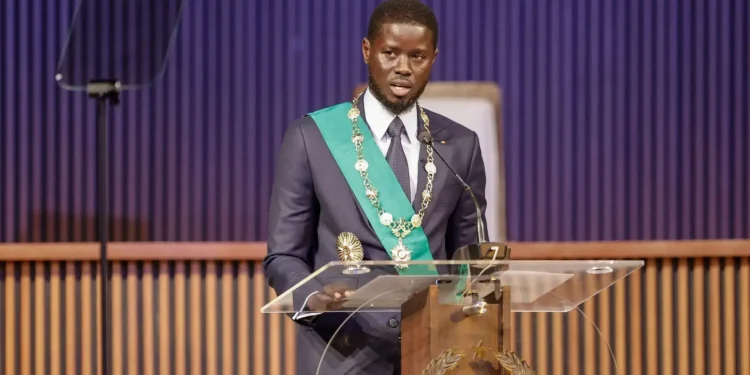Dakar: Leftist Pan-Africanist Bassirou Diomaye Faye became Senegal’s youngest president on Tuesday, promising systemic change after years of unrest and naming his mentor, opposition figure Ousmane Sonko, prime minister.
Faye, 44, has never held elected office. Ten days after being released from prison, he won the first round with a promise of radical reform.
He then returned to the capital, greeted by hundreds of happy citizens who lined the road leading to the presidential palace.
Macky Sall, his predecessor, gave Faye the key to the presidential headquarters before leaving the palace.
“Before God and the people of Senegal, I swear to faithfully carry out the duties of the President of the Republic of Senegal,” he said.
A few hours later, the new government appointed opposition leader Sonko as prime minister.
“Mr. Ousmane Sonko has been appointed prime minister,” said the president’s chief secretary, Oumar Samba Ba, in a statement on RTS public television.
Sonko, 49, has been at the center of a two-year conflict with the state that has fueled severe unrest. He was disqualified from the final race and chose Faye to replace him in the presidential election.
The former tax inspector is Senegal’s fifth president since independence from France in 1960 and the first to openly embrace polygamy.
“I know the results of the ballot box are very necessary for systemic change,” he said.
Faye and Sonko are opposition politicians jailed 10 days before the March 24 presidential election because of an amnesty announced by former president Mackie Sally, who tried to delay the vote.
“I have painful memories of the martyrs of Senegal’s democracy, amputees, wounded and former prisoners,” said Fay, noting that dozens have been killed and hundreds arrested in the past decade of political unrest.
Often called Diomay, or “honorable”, he won the election with 54.3% of the vote, promising radical change.
Working with his populist mentor Sonko, Fay’s campaign set priorities for national reconciliation, easing the cost of living and fighting corruption.
He also promised to restore national sovereignty over key resources such as oil, gas and fisheries.
Senegal will start hydrocarbon production later this year.
Faye also wants to replace the CFA franc, which he sees as a French colonial legacy, with a new common regional currency and invest more in agriculture to ensure food self-sufficiency.
After three turbulent years in the traditionally stable country, his democratic victory was welcomed internationally by Washington, Paris, the African Union and the European Union.
On the international stage, Faye tried to bring military-ruled Burkina Faso, Mali and Niger into the Economic Community of West African States (ECOWAS) bloc.
On Tuesday, he called for “greater solidarity” among African countries on security challenges.
Burkina Faso’s leader, Captain Ibrahim Traore, earlier tweeted that Faye’s mandate was “a symbol of a new era for an unlimited, free and sovereign Africa”.
He expressed his readiness to cooperate in “Renewal of regional and international cooperation”.
UN Secretary-General Antonio Guterres called the swearing-in ceremony “a testament to the people of Senegal for their struggle for the right to vote.”





















